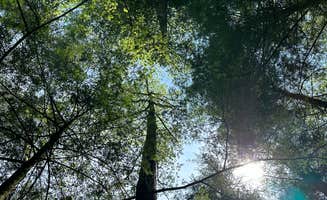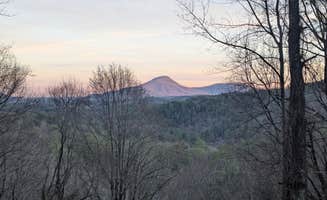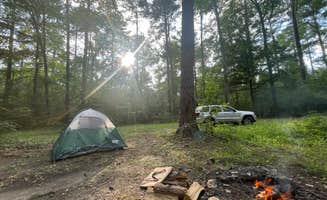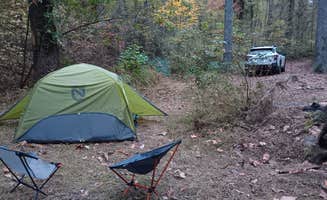Dispersed camping sites near Winder, Georgia offer rustic outdoor experiences without developed facilities. Located in the southern Appalachian foothills, the terrain ranges from gently rolling hills to more rugged forest landscapes. Most primitive camping areas sit at elevations between 900-1,500 feet, creating moderate temperature variations between day and night, particularly in spring and fall.
What to do
Waterfall exploration: Multiple primitive camping locations provide access to small cascades and falls. The creek at Jones Creek Dispersed Campground features "low current makes its easy to walk in and there are a few little water falls we enjoyed hanging on for a bit," according to camper Billie P.
Wildlife watching: Early mornings offer the best opportunities for spotting deer, turkeys, and various bird species. Campers should maintain distance from wildlife and avoid feeding animals. The natural setting at Tyler Hunt Camp provides "a refuge" where "it's quiet, super dark at night and beautiful," notes LeeAnne T.
Stargazing: The minimal light pollution at many dispersed sites creates exceptional night sky viewing conditions. Bring red-light headlamps to preserve night vision while moving around camp. Tyler Hunt Camp offers particularly dark skies, with one visitor describing it as "super dark at night."
What campers like
Privacy between sites: Many dispersed camping areas offer natural buffers between camping spots. At Dicks Creek Falls Campsites, "They have a couple closer to water but most are more remote," according to Lacy S., providing options for those seeking either creek access or seclusion.
Creek access: Several primitive sites feature creek frontage for wading and cooling off. Jones Creek Dispersed Campground has a creek that's "amazing, low current makes its easy to walk in," perfect for relaxing on hot days.
Natural setting: The undeveloped nature of these sites appeals to those seeking authentic outdoor experiences. "This place is a refuge. There are privately owned homes around but the folks keep to themselves," writes LeeAnne T. about Tyler Hunt Camp, highlighting the balance between accessibility and seclusion.
What you should know
Site availability challenges: During peak seasons, securing a spot requires early arrival. At Dicks Creek Falls Campsites, "There is only 5 or 6 spots available for first come first serve camping," and it becomes "very popular in summer time," with Lacy S. reporting it was "over full" during summer 2024.
Road conditions: Most dispersed camping areas require traveling on unpaved roads of varying quality. Dicks Creek Falls involves "a 3 mile long dirt road," while Jones Creek has "decent narrow dirt roads" leading to camping spots.
Variable activity levels: Usage patterns change throughout the day and seasons. At Concord Hunt Camp, weekday usage remains low compared to weekends, while Tyler Hunt Camp experiences more traffic after dark, with one camper noting "vehicles coming and going—at least three within an hour" in the evening.
Tips for camping with families
Safety considerations: Unimproved sites require additional safety planning for families with children. Keep kids away from unfamiliar plants and establish clear boundaries around camp. At Tyler Hunt Camp, be aware that "there were old weedeaters scattered in the weeds, along with grills and other items that seemed to have been tossed into the woods," according to Micah C.
Water activities: Creek access provides natural entertainment for children, but supervision is essential. The gentle current at Jones Creek makes it "easy to walk in" with "a few little water falls" that are suitable for wading but require adult supervision.
Timing your visit: For quieter experiences with children, weekday camping during shoulder seasons (late spring or early fall) offers more solitude and comfortable temperatures. Avoid summer weekends when Dicks Creek Falls becomes "over full" as reported by recent visitors.
Tips from RVers
Site access limitations: Most dispersed sites near Winder have limited space for larger vehicles. While Jones Creek is marked as "big-rig-friendly," reviews suggest caution when navigating the "narrow dirt road" to reach camping areas.
Leveling challenges: Prepare for uneven terrain at most primitive sites. Bring leveling blocks and scout locations thoroughly before setting up. The natural landscape means few perfectly flat spots exist at any of these rustic camping locations.
Self-containment requirements: With no facilities available, RVers must plan for complete self-sufficiency. Jones Creek operates on a "free" basis but requires campers to pack out all waste and supply their own necessities, including sufficient water for the duration of their stay.





